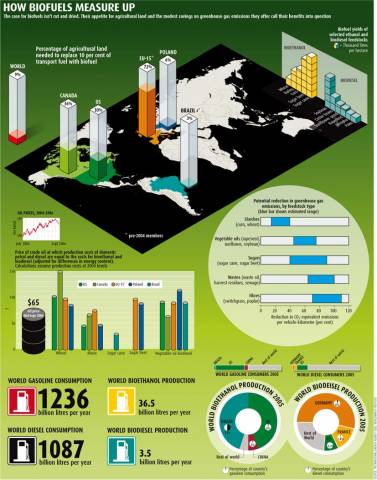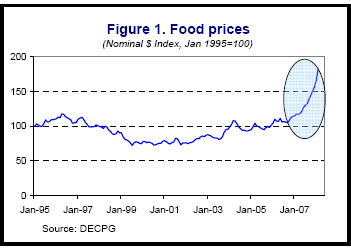New Face Of Hunger
Ban Ki-moon, the UN Secretary General, warns that the rapidly escalating price of food is increasing world hunger.
The prices of basic staples — wheat, corn, rice — are at record highs, up 50 percent or more in the past six months. Global food stocks are at historic lows. The causes range from rising demand in major economies such as India and China to climate- and weather-related events such as hurricanes, floods and droughts that have devastated harvests in many parts of the world. High oil prices have increased the cost of transporting food and purchasing fertilizer. Some experts say the rise of biofuels has reduced the amount of food available for humans.
The effects are widely seen. Food riots have erupted from West Africa to South Asia. In countries where food has to be imported to feed hungry populations, communities are rising to protest the high cost of living. Fragile democracies are feeling the pressure of food insecurity. Many governments have issued export bans and price controls on food, distorting markets and presenting challenges to commerce.
In January, to cite one example, Afghan President Hamid Karzai appealed for $77 million to help provide food for more than 2.5 million people pushed over the edge by rising prices. He drew attention to an alarming fact: The average Afghan household now spends about 45 percent of its income on food, up from 11 percent in 2006.
This is the new face of hunger, increasingly affecting communities that had previously been protected. Inevitably, it is the “bottom billion” who are hit hardest: people living on one dollar a day or less. When people are that poor, and inflation erodes their meager earnings, they generally do one of two things: They buy less food, or they buy cheaper, less nutritious food. The result is the same — more hunger and less chance of a healthy future. The U.N. World Food Program is seeing families that previously could afford a diverse, nutritious diet dropping to one staple and cutting their meals from three to two or one a day.
There’s a tragic irony in the rise of oil prices having a twin effect on hunger in the developing world, since they’re relatively small consumers of energy. But higher oil prices make it more expensive to produce food and make it more attractive to turn formerly cheap sources of food into energy via ethanol and other biofuels.
Via Mark Leon Goldberg, who hopes a massive increase in state donations to the World Food Program will be forthcoming as a stopgap measure.






Just a thought, but given that the western economies are hurt by the increase in fuel costs (thus making them harder to provide the charity), wouldn’t it make sense to go to the people who are benefiting from the increase in fuel costs?
For those who think the UN is the answer to all questions, what is the UN doing to get the energy exporters to pony up the money?
That’s always been the conundrum in the “no blood for oil” dictum. For most us here in the U. S. a doubling in the price of oil is an inconvenience or, at most, causes us to tighten our belts a little (some of us could use it). In many countries a doubling in the price of oil brings starvation and disaster.
OMG!
Two posts in a row where I agree with YAJ. This is getting scary.
How is that a conundrum? It’s not like us spilling our blood keeps their oil prices down…
Tlaloc,
Have heart. I am sure that it is just the case of the stopped clock. No portent of an impending apocalypse.
Well, well, cause much of the problem and then complain (set up for more bucks to share?)
It was this very world body (decayed as it is)that structured the great big hoax of global warming that caused/allowed the eco-freaks and the politicians they control to start with the ethanol and its related environmental destruction.
Better the precious rain forest fall than our “pristine” ANWAR?
And now the EU is threatening to kick off a tariff war (think depression) if we don’t capitulate and sign “Son of Kyoto”
Not to worry about that though, all three of our potential illustrious leaders have already pulled their Lord Chamberlain imitation on this phoney issue (son of Kyoto)- this time the headline for history to mock is “We have green in our time”
What fools we mortals be, to be led by such destructive but noisy forces. Is there no sanity left?